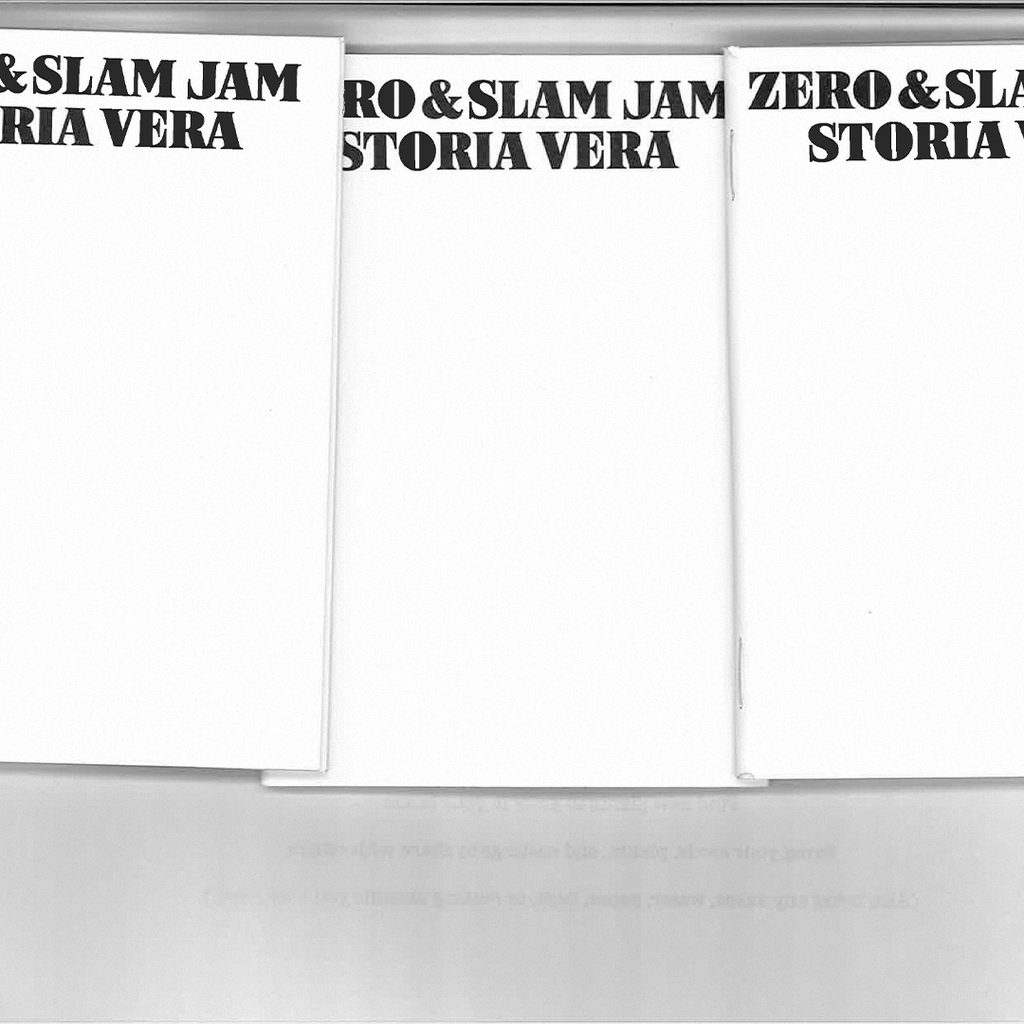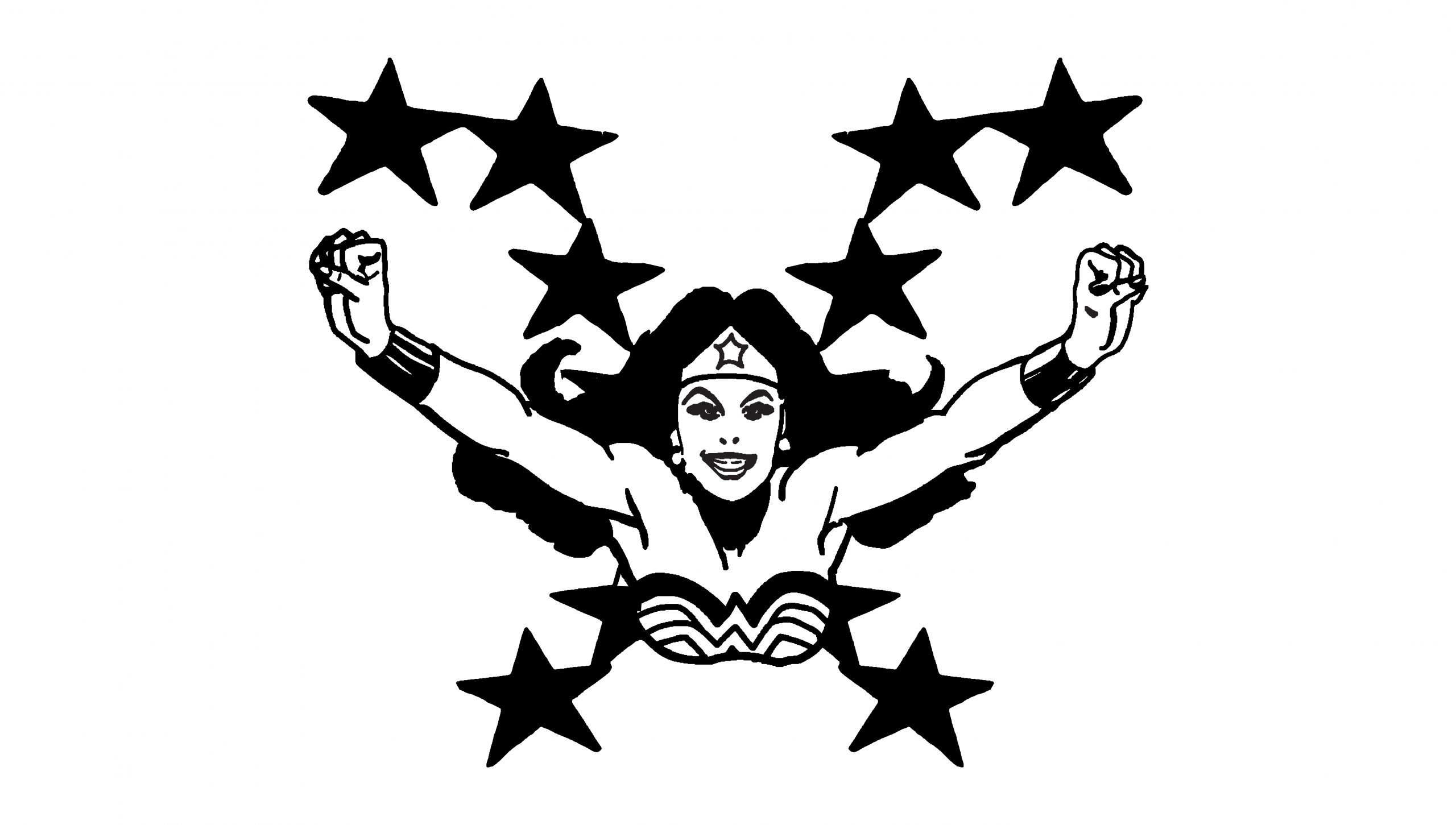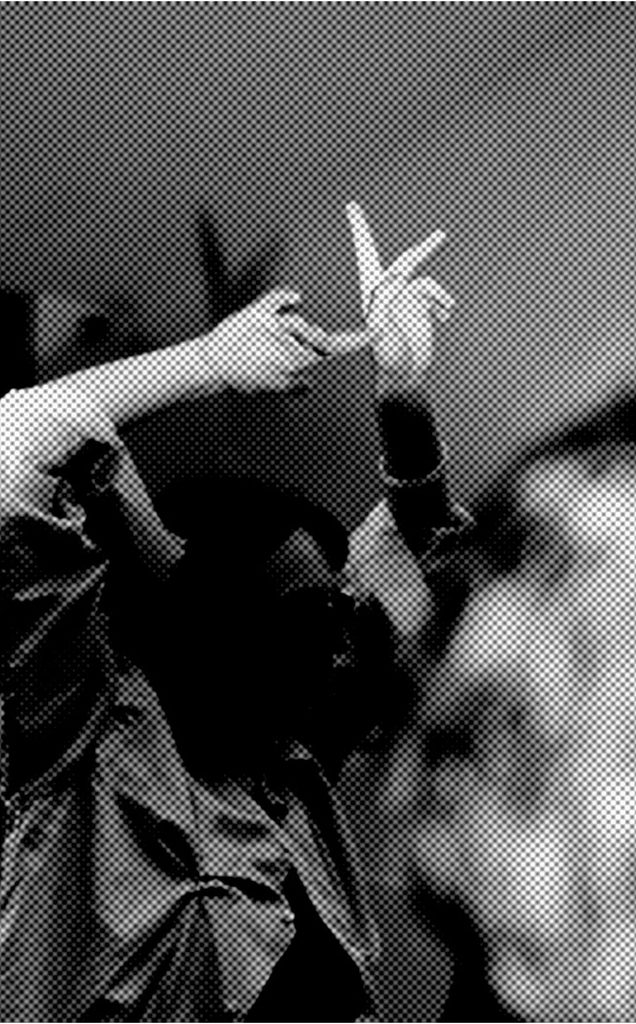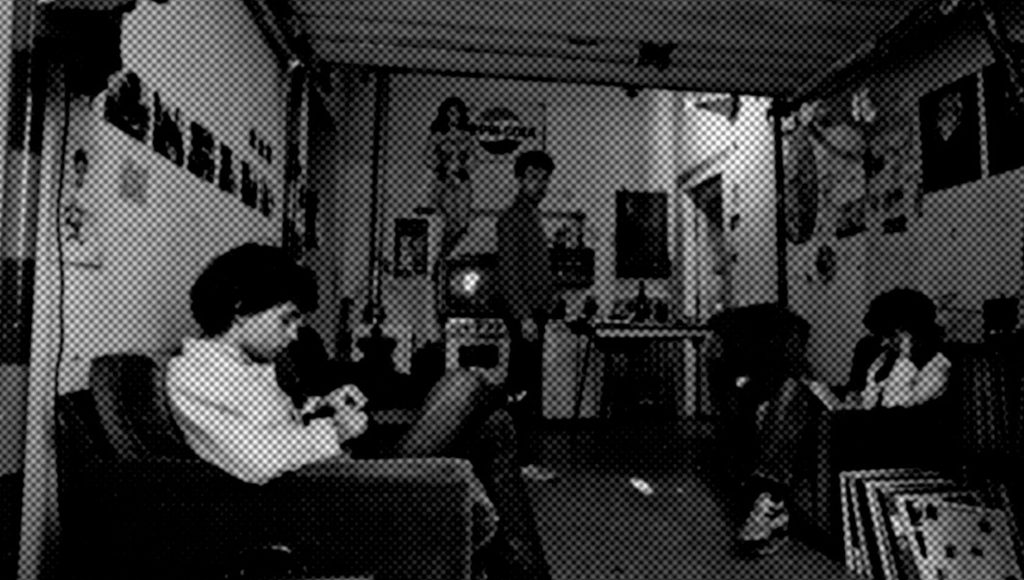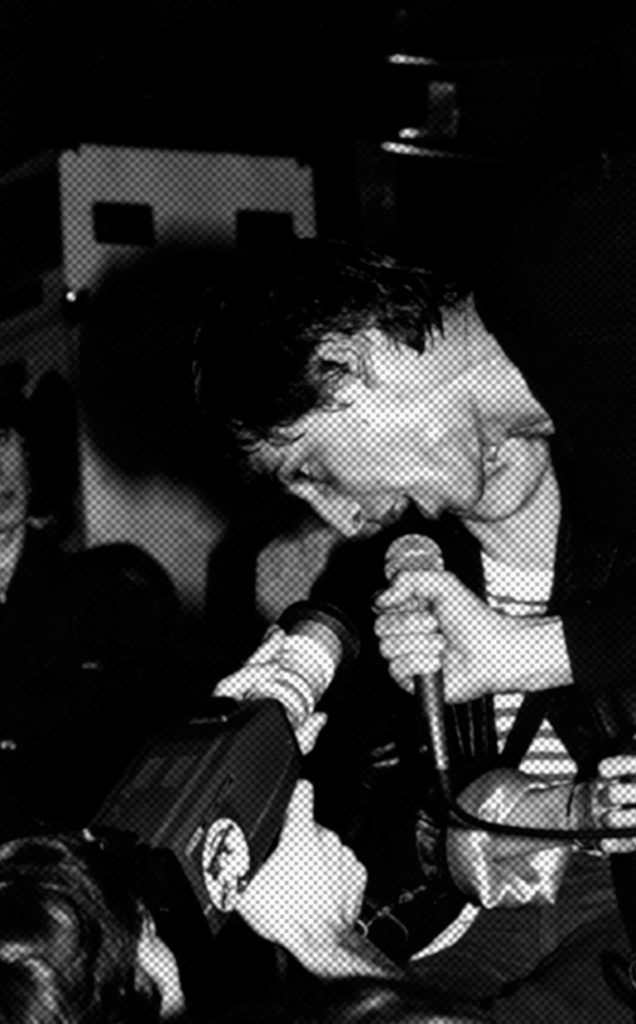Versione italiana
(English version below)
Inizio degli anni Ottanta. Il mostro televisivo e pubblicitario si annuncia all’orizzonte dell’immaginario collettivo, come promessa e come minaccia. L’orrore che oggi, trent’anni dopo, conosciamo del tutto dispiegato, appariva allora come un’ombra, come una premonizione. Traum Fabrik schizza su cartaccia il sentimento del tempo che viene con un misto d’ironia sprezzante e di sperimentalismo autolesionista. Né cinico né ribelle lo spirito Traum Fabrik si enuncia come incubo narcotico premonitorio.
Nel passaggio di quei primi anni Ottanta stavamo assistendo alla transizione dall’ironia predominante nel linguaggio delle radio libere al cinismo che domina nel linguaggio delle televisioni commerciali e della pubblicità dilagante. Traum Fabrik si piazza lì in mezzo, nel punto di passaggio, con quei colori acidi, con quelle immagini pubblicitarie detournate, trasformando il glamour in orrore, e l’orrore in glamour.
Negli anni Settanta avevamo cercato di coniugare lirico ed epico, e avevamo tentato di evitare il tragico. “Dal lirico all’epico evitando il tragico” è il titolo di un numero di A/traverso che uscì nella primavera del 1977, mentre a centinaia i poeti ribelli erano incarcerati o fuggivano inseguiti da giudici e poliziotti. Il gioco di parole contenuto in quel titolo si poteva leggere a due diversi livelli. Anzitutto era un messaggio rivolto agli operai che si riunirono al Teatro Lirico di Milano, proprio nei mesi in cui gli studenti e i disoccupati avevano lanciato l’insurrezione dadaista e autonoma che aveva toccato le punte più alte nelle città di Roma e di Bologna. In secondo luogo conteneva una lettura dell’evoluzione passata e presente del movimento insurrezionale, e conteneva un auspicio per la sua evoluzione futura.
Lirico epico e tragico erano forme linguistiche, poetiche e mitiche di una comunità che cercava la liberazione dell’intera società dal dominio del capitale e anche dalla Dittatura del Significato e della Severità. Il momento lirico era quello lungamente esperito nelle esperienze degli anni precedenti, negli anni di formazione della comunità desiderante, affettuosa, amorosa, sognante di cui parla Enrico Palandri nel suo indimenticabile Boccalone, il romanzo che racconta storie d‘amore e di ribellione di studenti bolognesi.
Né cinico né ribelle lo spirito Traum Fabrik si enuncia come incubo narcotico premonitorio.
Nei primi anni Settanta in Italia si erano diffusi comportamenti di allegro rifiuto del lavoro, della noia borghese e della competizione economica, ma anche del familiarismo cattolico, e dell’autoritarismo stalinista. Avevamo letto Antiedipo di Deleuze e Guattari, avevamo letto le poesie di Antonin Artaud e Majakovskij e il comunismo operaio si era per noi mescolato con la schizopolitica e le tematiche del desiderio libertario.
La comunità desiderante nella nostra immaginazione aveva però un compito storico, o almeno così ci pareva in quel periodo di intenso attivismo insurrezionale e politico. Il nostro compito era passare dall’autonomia esistenziale e poetica alla conquista di spazi nella città, alla rottura del dominio economico e alla rivoluzione politica libertaria. Rivoluzione è una parola grossa, una parola che avevamo preso in prestito dalla tradizione del primo Novecento. Non la prendevamo troppo sul serio, come dimostra un foglio che pubblicammo nel giugno del 1977, con un titolo ironico che diceva: LA RIVOLUZIONE È FINITA ABBIAMO VINTO.
Non la prendevamo troppo sul serio, la rivoluzione, perché non credevamo nella possibilità di rimettere il mondo sui suoi piedi, di sovvertire dal basso verso l’alto e dall’alto verso il basso. Non credevamo che ci sia una verità da ristabilire, rovesciando l’ordine del discorso dominante per sostituirlo con un altro ordine. Nessun ordine andava rispettato, neppure quello della rivoluzione. Credevamo piuttosto a un’insurrezione desiderante nella quale ciascuno potesse andarsene nella direzione preferita senza posizioni prestabilite e obbligatorie come le posizioni che la dialettica rivoluzionaria del passato aveva affermato con sicurezza severa. Non prendevamo la rivoluzione troppo sul serio, però quella parola ci piaceva.
Perciò pensavamo alla rivoluzione come un momento EPICO che deve venire necessariamente dopo il momento LIRICO del ritrovarsi, dell’unirsi, dopo il momento della ricomposizione sociale e politica della classe operaia e dei lavoratori cognitivi in un movimento insurrezionale. Giocando sulle parole chiamavamo il movimento operaio che si era ritrovato nel teatro milanese a procedere dal momento lirico della ricomposizione felice al momento epico della sovversione dispiegata. Ma sapevamo bene che lungo questa strada già molte volte il movimento aveva dovuto attraversare momenti di violenza, di terrore, di autodistruzione e di totalitarismo. Era il tragico che ci proponevamo di evitare.
La storia di quel movimento e di quegli anni di passaggio dalla tarda modernità alla post-modernità degli anni ottanta, si potrebbe leggere attraverso la lente d’ingrandimento di figure retoriche, e di forme poetiche (ed etiche).
Lo evitammo? No, non lo evitammo, come dimostra la storia degli anni successivi: il terrorismo si diffuse in Italia per effetto della repressione statale e per effetto di ideologie antiche che avevano ancora un profondo radicamento nella realtà sociale e culturale italiana. Dopo la fase libertaria e felice dei movimenti venne il momento tragico e totalitario del terrorismo. E l’eroina si diffuse negli anfratti del desiderio trascinando la comunità nell’estasi sospesa di un sogno che attende di sprofondare nell’imminente incubo della dipendenza della paura e del tacchino freddo. Traum Fabrik era lo spazio in cui si sperimentava quell’estasi quella sospensione e quell’incubo nell’esistenza e nella creazione. Avevamo promesso a noi stessi di passare dal lirico all’epico, cioè dall’allegria affettuosa della comunità desiderante all’esplosione epica delle potenzialità sociali liberatorie. E al contempo, volevamo evitare il tragico, la violenza, la repressione e il terrore. Non riuscimmo in quel progetto, ma non dipendeva soltanto dalla nostra volontà. La storia di quel movimento e di quegli anni di passaggio dalla tarda modernità alla post-modernità degli anni ottanta, si potrebbe leggere attraverso la lente d’ingrandimento di figure retoriche, e di forme poetiche (ed etiche): diversi stili di espressione che si succedettero nello spirito del tempo.
Il lirismo, l’epica e la tragedia furono certamente forme espressive di grande rilievo nella storia dei movimenti di quegli anni. Quando il linguaggio lirico (intimo, sussurrato e amichevole) cercò di trasformarsi in un linguaggio epico, (storico, altisonante e aggressivo) molto spesso incontrò la tragedia della storia che proveniva dalla storia delle grandi rivoluzioni del ventesimo secolo, e la tragedia di un futuro che sembrava in via di cancellazione come il punk ci annunciava. Traum Fabrik annuncia alla paciosa provincia emiliana il messaggio del punk, e lo traduce nei colori schizoidi e nelle forme psicopatiche di carte imbrattate in attesa che arrivi il pusher. Come definire dal punto di vista linguistico lo stile Traum Fabrick? C’è ironia, ma c’è anche tragedia, e c’è soprattutto premonizione oscuramente luminosa.
Traum Fabrik esibisce l’estasi e il tormento, scherza l’inevitabile, lo iscrive nella carne, sprofonda nell’abisso psicopatico.
Cosa è l’ironia? Domanda difficilissima. Gli studiosi rispondono che l’ironia è una figura retorica che ci permette di dire una cosa dicendo in apparenza il suo contrario, o comunque di dire qualcosa dicendo qualcosa di molto differente. Naturalmente questa è una definizione possibile dell’ironia, ma non direi che si tratta di una definizione perfetta. Infatti non esiste una definizione perfetta dell’ironia. L’ironia non è definibile. Definire l’ironia è qualcosa di decisamente troppo poco ironico. Se proprio mi chiedete di definire questa parola, direi che l’ironia è un gesto di linguaggio che sortisce un effetto di sospensione della realtà. Sospendere la realtà significa non sentirne il peso. Ecco, direi che l’ironia è un gesto linguistico che permette a chi lo compie di non sentire il peso della realtà, di sentirsi libero dal peso della realtà. Onnipotenza del linguaggio, effetto di leggerezza.
Traum Fabrik mette in scena una forma di tragica ironia premonitoria. L’ironia mette in sospensione il peso della realtà, gioca il significante contro il significato, e sceglie tra le mille possibili interpretazioni quella che appare più leggera, più ariosa, più volatile. L’ironia allarga infinitamente il campo del significato fino a rendere possibile il collegamento semantico di qualsiasi significato a qualsiasi significante. Libertà dal peso della relazione di significato, questa è l’ironia. Allargamento del campo dell’interpretazione fino a liberarsi della realtà.
Ma la realtà incombeva, sulla scena storica, sociale, negli anni in cui Margareth Thatcher e Ronald Reagan iniziavano l’offensiva neoliberista che nel tempo ha spazzato via le tracce della solidarietà tra esseri umani. Negli anni in cui la guerra riprendeva il suo posto, cupo signore delle vicende umane.
Traum Fabrik esibisce l’estasi e il tormento, scherza l’inevitabile, lo iscrive nella carne, sprofonda nell’abisso psicopatico. Incubo premonitorio cartografa il futuro.
English version
The beginning of the 1980s. The television and advertising monster announces itself on the horizon of the collective imagination, as a promise and as a threat. The horror that we now, thirty years later, fully understand, appeared then as a shadow, as a premonition. Traum Fabrik sketches on paper the sentiment of the coming time with a mixture of disdainful irony and self-injurious experimentation. Neither cynical nor rebellious, the spirit of Traum Fabrik is expressed as a narcotic premonitory nightmare.
During the transition of those early 1980s, we were witnessing the shift from the predominant irony in the language of free radios to the cynicism that dominates the language of commercial television and rampant advertising. Traum Fabrik positions itself in the middle, at the point of transition, with those acid colors, with those detourned advertising images, transforming glamour into horror, and horror into glamour.
In the 1970s, we had tried to combine the lyrical and the epic, and we had attempted to avoid the tragic. “From the lyrical to the epic, avoiding the tragic” is the title of an issue of A/traverso that was published in the spring of 1977, while rebellious poets were being imprisoned or fleeing from judges and policemen. The play on words contained in that title could be read at two different levels. Firstly, it was a message addressed to the workers who gathered at the Teatro Lirico in Milan, just at the time when students and unemployed people had launched a Dadaist and autonomous insurrection that reached its peak in the cities of Rome and Bologna. Secondly, it contained an interpretation of the past and present evolution of the insurrectionary movement and held a hope for its future evolution.
Lyrical, epic, and tragic were linguistic, poetic, and mythical forms of a community that sought the liberation of the entire society from the dominance of capital and also from the Dictatorship of Meaning and Severity. The lyrical moment was the one long experienced in the experiences of the previous years, in the formative years of the desiring, affectionate, loving, and dreaming community that Enrico Palandri talks about in his unforgettable Boccalone, the novel that tells the stories of love and rebellion of Bolognese students.
Neither cynical nor rebellious, the spirit of Traum Fabrik is expressed as a narcotic premonitory nightmare.
In the early 1970s, behaviors of joyful rejection of work, bourgeois boredom, and economic competition had spread in Italy, as well as rejection of Catholic familiarity and Stalinist authoritarianism. We had read Anti-Oedipus by Deleuze and Guattari, we had read the poems of Antonin Artaud and Mayakovsky, and for us, workers’ communism had blended with schizo-politics and the themes of libertarian desire.
However, the desiring community in our imagination had a historical task, or at least it seemed so in that period of intense insurrectionary and political activism. Our task was to move from existential and poetic autonomy to the conquest of spaces in the city, to the rupture of economic dominance, and to the libertarian political revolution. Revolution is a big word, a word that we borrowed from the tradition of the early 20th century. We didn’t take it too seriously, as demonstrated by a leaflet we published in June 1977, with an ironic title that said: “THE REVOLUTION IS OVER WE HAVE WON.”
We didn’t take the revolution too seriously because we didn’t believe in the possibility of turning the world upside down, of subverting from the bottom to the top and from the top to the bottom. We didn’t believe that there was a truth to be restored by reversing the order of the dominant discourse and replacing it with another order. No order was to be respected, not even that of the revolution. Instead, we believed in a desiring insurrection in which everyone could go in their preferred direction without predetermined and obligatory positions like the positions affirmed with severe certainty by the revolutionary dialectic of the past. We didn’t take the revolution too seriously, but we liked that word.
Therefore, we thought of the revolution as an EPIC moment that necessarily had to come after the LYRIC moment of reunion, of coming together, after the moment of social and political recomposition of the working class and cognitive workers in an insurrectionary movement. Playing with words, we called the workers’ movement that had gathered in the Milan theatre to proceed from the lyrical moment of joyful recomposition to the epic moment of unleashed subversion. But we knew very well that along this path the movement had already had to go through moments of violence, terror, self-destruction, and totalitarianism. It was the tragic that we intended to avoid.
The history of that movement and those years of transition from late modernity to the post-modernity of the 1980s could be read through the magnifying lens of rhetorical figures and poetic (and ethical) forms.
Did we avoid it? No, we didn’t avoid it, as the history of the following years shows: terrorism spread throughout Italy as a result of state repression and the influence of ancient ideologies that still had a deep root in Italian social and cultural reality. After the libertarian and joyful phase of the movements, the tragic and totalitarian moment of terrorism came. And heroin spread in the recesses of desire, dragging the community into the suspended ecstasy of a dream waiting to sink into the imminent nightmare of the dependence of fear and cold turkey. Traum Fabrik was the space where that ecstasy, that suspension, and that nightmare were experienced in existence and creation. We had promised ourselves to transition from the lyrical to the epic, from the affectionate joy of the desiring community to the epic explosion of liberating social potential. And at the same time, we wanted to avoid the tragic, violence, repression, and terror. We didn’t succeed in that project, but it didn’t depend solely on our will. The history of that movement and those years of transition from late modernity to the post-modernity of the 1980s could be read through the magnifying lens of rhetorical figures and poetic (and ethical) forms: different styles of expression that succeeded each other in the spirit of the time.
Lyrical, epic, and tragic were certainly significant forms of expression in the history of the movements of those years. When the lyrical language (intimate, whispered, and friendly) tried to transform into an epic language (historical, lofty, and aggressive), it often encountered the tragedy of history stemming from the history of the great revolutions of the twentieth century and the tragedy of a future that seemed to be erasing itself, as punk was announcing. Traum Fabrik announces the message of punk to the peaceful Emilian province and translates it into schizoid colors and psychopathic forms of scribbled cards, waiting for the pusher to arrive. How can we linguistically define the style of Traum Fabrik? There is irony, but there is also tragedy, and above all, there is an obscurely luminous premonition.
Traum Fabrik exhibits ecstasy and torment, jokes about the inevitable, inscribes it into the flesh, sinks into the psychopathic abyss.
What is irony? A very difficult question. Scholars say that irony is a rhetorical figure that allows us to say one thing while apparently saying its opposite or saying something very different. Of course, this is one possible definition of irony, but I wouldn’t say it is a perfect definition. In fact, there is no perfect definition of irony. Irony is indefinable. To define irony is something decidedly lacking in irony. If you really ask me to define this word, I would say that irony is a linguistic gesture that produces an effect of suspending reality. Suspending reality means not feeling its weight. That’s it, I would say that irony is a linguistic gesture that allows the person who performs it to not feel the weight of reality, to feel free from the weight of reality. The omnipotence of language, the effect of lightness.
Traum Fabrik stages a form of premonitory tragic irony. Irony suspends the weight of reality, plays the signifier against the signified, and chooses among the countless possible interpretations the one that appears lighter, airier, more volatile. Irony infinitely expands the field of meaning to make any meaning connect to any signifier semantically possible. Freedom from the weight of the relationship of meaning, that is irony. Expansion of the field of interpretation to liberate oneself from reality.
But reality loomed over the historical and social scene in the years when Margaret Thatcher and Ronald Reagan began the neoliberal offensive that over time has wiped away the traces of solidarity among human beings. In the years when war regained its place, a dark lord of human affairs.
Traum Fabrik exhibits ecstasy and torment, jokes about the inevitable, inscribes it into the flesh, sinks into the psychopathic abyss. Premonitory nightmare maps the future.
